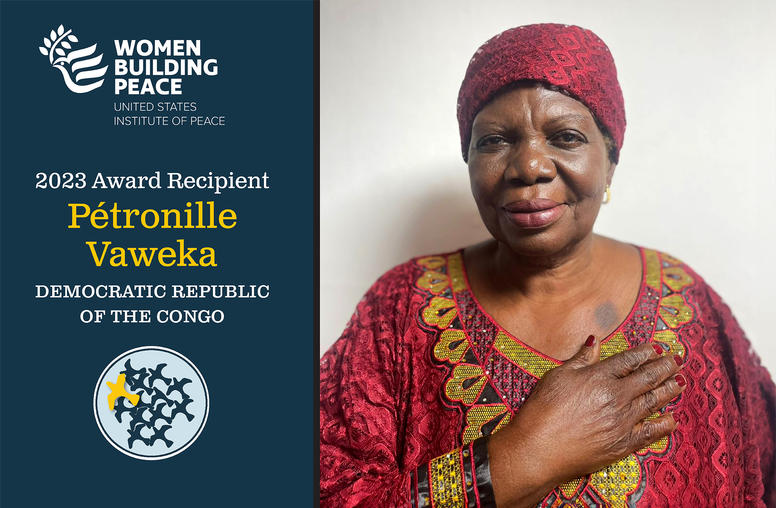Co-Chairs of QDR Panel, Facilitated by U.S. Institute Of Peace, Testify Before House Armed Services Committee
William J. Perry and Stephen J. Hadley testified today before the House Armed Services Committee on the "Quadrennial Defense Review (QDR) Independent Panel" which is facilitated by the United States Institute of Peace (USIP). The QDR Independent Panel, which includes 12 appointees of Secretary of Defense Robert Gates and eight appointees of Congress, has been asked to submit a written assessment of the QDR by July 15, 2010.
For Immediate Release, April 15, 2010
Contact: Lauren Sucher, 202/429-3822
(Washington) -- William J. Perry and Stephen J. Hadley testified today before the House Armed Services Committee on the "Quadrennial Defense Review (QDR) Independent Panel" which is facilitated by the United States Institute of Peace (USIP). The QDR Independent Panel, which includes 12 appointees of Secretary of Defense Robert Gates and eight appointees of Congress, has been asked to submit a written assessment of the QDR by July 15, 2010.
In a joint statement, the co-chairs said that the security challenges facing the United States today are much different than the ones we faced over a decade ago.
"We are currently involved in two conflicts abroad. Our men and women in uniform continue to advise and support Iraqi security forces in an effort to responsibly transition and drawdown U.S. forces. In Afghanistan, our military continues to fight alongside our partners and allies to deny al-Qaida a place of operation, to counter insurgent efforts, and to establish an Afghan security force capable of defending its people. By the end of 2010, approximately 100,000 U.S. military personnel will be in Afghanistan. There is no doubt, as Secretary Gates has stated, this is truly a wartime QDR."
Perry and Hadley note that in addition to ongoing military operations in Iraq and Afghanistan, the United States faces a geopolitical landscape that is increasingly dynamic and significantly more complex. "Traditional state and non-state actors are highly adaptable. Information and advanced technologies are readily available. The proliferation of weapons of mass destruction and the potential for their use by terrorists remains an omnipresent threat to U.S. and global security. The international system continues to evolve with the rise of China and India. Finally, energy constraints, potential environmental changes, resource competition, communicable diseases and population shifts are only a few of the challenges that will continue to make the geopolitical system extremely volatile. If you add the recent financial downturn and potential impending budgetary constraints, the U.S. and the Department of Defense face incredibly daunting challenges in the years ahead. But these challenges can be overcome."
The QDR Independent Panel, as mandated by the Fiscal Year 2010 National Defense Authorization Act (FY10 NDAA), is directed to:
- review the Secretary of Defense’s terms of reference, and any other materials providing the basis for, or substantial inputs to, the work of the Department of Defense on the 2009 QDR;
- conduct an assessment of the assumptions, strategy, findings, and risks in the report of the Secretary of Defense on the 2009 QDR, with particular attention paid to the risks described in that report;
- conduct an independent assessment of a variety of possible force structures for the Armed Forces, including the force structure identified in the report of the Secretary of Defense on the 2009 QDR; and
- review the resource requirements identified in the 2009 QDR and, to the extent practicable, make a general comparison of such resource requirements with the resource requirements to support the force structure.
To date, the QDR Independent Review Panel has met twice, once in February and again in March. Specifically, the QDR Panel intends to examine critically the following questions associated with the QDR:
- The Nature of 21st Century Conflict: The QDR Independent Panel will evaluate security challenges based both on the traditional construct of "potential adversaries" and on the non-traditional drivers of conflict, such as access to resources, mass migrations, and climate change, which will confront the United States over the next 20 years. The QDR Independent Panel will also review the assumptions, "trends, asymmetries, and concept of operations that characterize our military balance with potential adversaries."
- "Whole of Government" Capabilities: The panel will assess the integration of policies, plans, and activities of various organizations concerned with and involved in national and international security and stability including how those U.S. government departments and agencies involved in the interagency process relate to one another, with emphasis on national security, homeland security, international economics, and stabilization and reconstruction issues; and how those agencies and departments relate to the broader cast of organizations and entities focused on security and stability including nongovernmental organizations, the private sector, and multilateral organizations, such as the United Nations. The panel will address the increasing role of the civilian Department of Defense workforce and the use of contractors in conflict zones, including their proper use, scope of tasks, oversight and accountability. Additionally, it will address the status of the efforts to create an effective expeditionary civilian capability for dealing with post-conflict or failed/ failing state situations that often require a civil-military partnership operating in conflict zones.
- Force Structure and Personnel: The panel will examine in detail the force sizing construct used in the QDR, the resulting recommended force structure, and “conduct an assessment of a variety of possible force structures.” The panel will also "review the resource requirements” identified in the QDR, and "to the extent practicable, make a general comparison of such resource requirements with the resource requirements to support the forces” cited in the QDR. It will also examine the expected costs necessary to sustain a force structure and supporting end-strength – both in terms of active duty and reserve components - sufficient to perform the missions anticipated in the QDR. Additionally, accessions, career progression, healthcare, and retirement costs will all be critically evaluated in the context of how to manage the escalating costs of the All Volunteer Force, while still ensuring adequate defense resources for acquisitions and operations - all in the context of a decade or more of projected budget deficits.
- Acquisition and Contracting: Central to the Department of Defense’s ability to perform its missions are issues related to reform of both acquisition and contracting systems. The panel will critically assess both contract negotiation mechanisms and the acquisition process. It will evaluate the department’s ability to effectively and efficiently acquire equipment and contract with suppliers, so as to provide in timely fashion the hardware, services, and support needed by our men and women in uniform who are deployed in harm’s way. It will also evaluate the adequacy of acquisition expertise in the contracting community, the manner with which the department upgrades its IT systems, the impact of rising energy costs, and the need to build the capabilities of international partners.
- The QDR and Beyond: Since the QDR is now in its fourth iteration, the panel plans to assess the entire QDR process. The panel will evaluate congressional direction and Department of Defense implementation, the proper balance between medium and longer term perspectives, strategy and programs, force structure and resources, the realistic timelines for developing future QDRs, and appropriate integration with other related reviews including the National Security Strategy (NSS), Quadrennial Homeland Security Review (QHSR), Quadrennial Diplomacy and Development Review (QDDR), the Nuclear Posture Review (NPR) and the Ballistic Missile Defense Review. The panel will assess whether a more unconstrained, long-term and assumption-challenging process is required and how it might be achieved.
William J. Perry, former secretary of defense, served as chairman of the Congressional Commission of the Strategic Posture of the United States, which was convened by USIP in 2008 to examine the United States’ long-term strategic posture and make recommendations. Stephen J. Hadley, former national security adviser, is a senior international adviser at USIP and co-chairs its Senior Working Group on Middle East Peace. Perry and Hadley’s testimony is available online.

